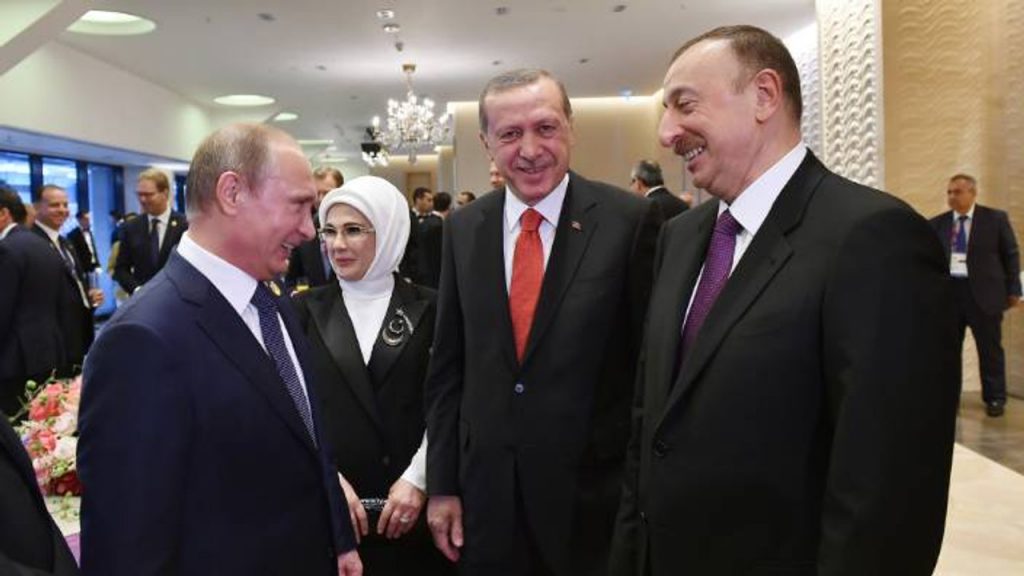

Nagorno-Karabakh crisis was over after seperatist Armenian forces surrendered to Azerbaijani operation. The second time in a row after 2020, Armenia and its supporters like the US and France are losing ground against Azerbaijan and its supporters. The archive picture shows Russian President Putin, Turkish President Erdoğan and Azerbaijani President Aliyev together in an international meeting with Mrs. Erdoğan behind them.
Nikol Pashinyan’s political inexperience and opportunism continue to cost Armenia dearly, while İlham Aliyev’s dynamic alliance policy and experience continue to benefit Azerbaijan. Of course, while the Armenian leadership’s supporters, particularly the US and France, are losing ground, Iran is skidding in place, if not losing ground. Meanwhile, along with Azerbaijan, Russia, Türkiye, and Israel are strengthening their positions.
Thanks to this Aliyev-Pashinyan, or Baku-Erivan equation, Azerbaijan reclaimed its territories under Armenian occupation in 2020 and made Armenia recognized Nagorno-Karabakh as Azerbaijani territory. The ceasefire announced on September 20, following a day-long military anti-terror operation, seems to have ensured the disbandment of the separatist armed forces in the local administration area of the Armenian population in Karabakh, who did not recognize the agreement, and brought that region to the table with the agenda of full integration with Azerbaijan.
Pashinyan made three mistakes during the Karabakh crisis.
First, he applied for membership in the International Criminal Court, which has ruled the arrest of Russian President Vladimir Putin for the war in Ukraine. Moscow warned of “very serious consequences”. In Armenia, where even the borders are protected by Russia, the government’s move was astonishingly clumsy, as it was intended to please the US administration under pressure from the Armenian diaspora for the 2024 elections.
The second was Pashinyan’s decision to hold a military exercise in Armenia with the US on September 11-20. The purpose of the exercise was NATO-led cooperation in peacekeeping operations, yet not a NATO-led one. To add insult to injury, Günther Fehlinger, the chairman of NATO’s European Enlargement Committee, called for Armenia’s NATO membership and Russia expressed deep concern. (There is no word yet on whether Fehlinger’s call will be made an issue by Türkiye within NATO).
The third was Armenia’s rejection of the Red Cross’ September 18 declaration that the Agdam-Hankendi (Stepanakert for Armenians) corridor secured by Azerbaijan could also be used for humanitarian transports to Nagorno-Karabakh together with the Lachin corridor. Thus, it became clear that Yerevan’s motivation was not humanitarian but political, the control over the Lachin corridor being the target.
On September 19, when Armenian militants killed four Azerbaijani policemen with a road mine, Azerbaijan launched an operation.
Türkiye was the first to support Azerbaijan. In his speech at the UN General Assembly, President Tayyip Erdoğan said that this was a security operation within Azerbaijan’s own borders because Nagorno-Karabakh is Azerbaijani territory, as officially recognized by Armenia in 2020. He underlined that Türkiye and Azerbaijan were “two states but one nation” and this was recorded in the minutes of the UN General Assembly, perhaps for the first time.
The first and the biggest alarmist against Azerbaijan was France. The French Foreign Ministry urged Azerbaijan to stop the operation immediately, claiming that it jeopardized European security. Together with the United States, they called for a meeting of the UN Security Council to stop the operation.
However, two other things happened in the meantime.
First, Russia, which had military observers in Nagorno-Karabakh, announced that it would not intervene. Angered by this, Armenians took to the streets in Yerevan against Pashinyan. Second, Iran said that Armenia had complained that Azerbaijan was going to attack it, but that it had contacted the Azeri government and was told that this was not the case. With a third of its population being Azeri Turks, Iran apparently did not want to get too much involved.
On the phone, Aliyev told US Secretary of State Antony Blinken, who asked him to stop the operation, that this would only be possible if the Armenian militants laid down their arms. Within hours, before the sun had risen on September 20 at the UN headquarters in New York, it was first reported by Russian news outlets that the Armenian militants had laid down their arms, followed by the Azerbaijan Defense Ministry’s declaration of a ceasefire. On September 21, negotiations on the full integration of the Armenian region of Karabakh into Azerbaijan were to begin in the Yevlakh town in Azerbaijan.
The US and France probably thought that Russia would not be able to deal with Azerbaijan while it was busy with Ukraine, but they were wrong. This time Russia remained passive and frustrated the Armenian leadership, while Türkiye declared that it would stand by Azerbaijan militarily as it did in 2020.
Coincidentally, Israeli Prime Minister Benjamin Netanyahu, who supported Azerbaijan in the 2020 war to stand strong against Iran, was meeting with President Tayyip Erdoğan in Nev York on September 20 after many years.
Pashinyan claims that what happened to him was a “coup attempt by foreign powers” but his political future depends on whether he does not act under the guidance of the Armenian diaspora with their influence on domestic politics in countries such as the US and France.
In Turkish politics, the threat of imprisonment has reached CHP leader Özgür Özel. Presidential decrees…
The Cyprus issue has remained stuck in conceptual traps for decades, unable to move beyond…
It is understood that the meeting on June 29 between MİT President İbrahim Kalın and…
After five years, President Recep Tayyip Erdoğan had the opportunity to meet face-to-face again with…
Iranian women have been standing tall for years, not just against the regime, but also…
The U.S. Struck Iran at Israel’s Request. The U.S. launched B-2 heavy bombers from Whiteman…